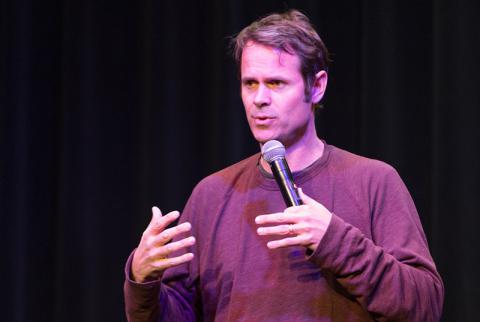Pandora Founder Tim Westergren Inspires Berklee Students at Zafris Lecture

Pandora founder Tim Westergren at Berklee
Photo by Mike Spencer
Pandora founder Tim Westergren spoke to a packed house of students at the 22nd annual James G. Zafris Distinguished Lecture for Berklee’s Music Business/Management Department. In introducing Westergren, department chair Don Gorder noted that Pandora, a personalized radio service “with its 81.5 million active listeners and 250 million registered users, is clearly the leader in digital consumption of music via streaming.” As Westergren told the students in attendance, however, his path to entrepreneurial success was neither straight nor smooth.
Road to Success Paved with Sleepless Nights
Westergren kicked off his talk by noting that, prior to founding Pandora, he nearly came to study at Berklee. “I had the brochure and I had my ideas for courses picked out, but I wound up deciding to stay in the Bay Area.”
Westergren’s Pandora experience partly grew out of his days working as a touring musician living in a van—where he saw “a lot of talented trees falling in the forest” due to lack of radio airplay—as well as his work in film scoring and composing for feature films. A big part of that job entailed presenting directors with some options that he could then use to home in on their taste for a project—a precursor to the process behind the Music Genome Project, the system of algorithms that powers Pandora.
That system, which Westergren compares to “DNA profiles of music,” is curated by Pandora employees with the kind of training in music that Berklee offers to its students.
“You really need a grounding in music theory to be able to extract this information,” Westergren said of the work behind mapping the relationships between similar or dissimilar songs.
While Pandora now stands as the biggest radio station in every market of the country, Westergren said, his goals were achieved only after many tough years in which he maxed out handfuls of credit cards and struggled with doubts and stress-induced insomnia.
“I pitched Pandora to investors 348 times before getting to ‘yes,’ and that’s no fun,” Westergren said.
Still, he knew his company had a compelling product, even if it hadn’t fully figured out the business model yet, and a turning point came in the fall of 2005. With a new CEO, Pandora retooled itself as a personalized radio platform, and then connected with Apple and rode the wave of smartphone growth into the ubiquity it now enjoys. Now, the company aims to “replace broadcast radio with a better experience,” and the numbers suggest it is well on its way to doing so.
Advice and Hope for New Music Entrepreneurs
For Berklee business students in attendance interested in furthering their own entrepreneurial ideas, Westergren offered this key testimony: “Most companies have a very hard time getting seed financing, and the process of hunting for money is exhausting and very demoralizing, so I think the best thing you can do is find a way to bootstrap for a while. Put your sweat into it and create some proof of concept before trying to get funding—some proof that people really like what you’re doing, even on a modest scale—and then go looking for financing.”
Westergren added that potential entrepreneurs must take a long, hard, and honest look at themselves before plunging ahead. Westergren knew that he would regret trying something and failing less than he would regret not having tried, but he added that not everyone comes to the same conclusion.
“It’s about your personal tolerance for insecurity and risk,” Westergren said. “I don’t think entrepreneurship is for everyone. Each person should ask themselves if they feel prepared to go through that.”
At the lecture’s conclusion, Berklee students swarmed around the Pandora founder to ask more questions and offer their appreciation. Mel Hart, a seventh semester songwriting student, drew inspiration to keep pursuing her music from Westergren’s words. “We hear a lot about the music industry going downhill, but I think the music industry is going to be fine,” Hart said. “Hearing him talk about helping get new artists discovered gave me even more hope.”
That sentiment is likely music to the ears of Berklee alumna Montse Carty ’04, artist programs manager at Pandora. Carty, who has worked at Pandora since 2013, encourages current Berklee students to “have the courage to go after what you love,” and points to her work with Gloria Estefan on Berklee’s 50th anniversary concert as a seed that helped her career path sprout.
Read more about Montse Carty and her advice for Berklee students here.
Another student attending the lecture, fifth semester music business/management major Klint Ruud, enjoyed the opportunity to hear directly from an entrepreneurial heavy hitter like Westergren. Ruud, who works as a talent buyer at Berklee’s Red Room at Cafe 939 and is starting up his own booking agency, said, “Innovative ideas are sparked at events like this.”
